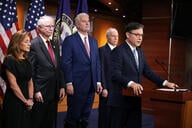You have /5 articles left.
Sign up for a free account or log in.

iStock
A federal appeals court ruled Monday that the University of Michigan could be dampening free speech on campus by allowing a group that helps students who have experienced potentially prejudicial acts to operate at the institution.
Speech First, a Washington, D.C.-based civil liberties watchdog, sued Michigan last year, asking for an injunction to halt the activities of the university’s Bias Response Team, which helps investigate incidents deemed racist, sexist, hostile to LGBTQ students or otherwise offensive to certain groups of people. Similar teams are common at other colleges and universities, but their functions vary.
Speech First claimed in its lawsuit that the Bias Response Team is illegal because it could potentially deter students from making statements or engaging in protests that some on campus might find offensive but might be protected under the First Amendment.
A U.S. District Court judge initially denied the injunction last year.
Michigan officials had successfully defended the response team, saying it could not discipline students who were behaving in ways perceived to be prejudicial. The group merely provides support for those on campus who felt they had been the targets of biased acts, the university argued in court filings. For instance, the team may reach out to an affected student to discuss an incident and discuss if the student wants to file a formal complaint with the university or campus police.
Team members can ask a student who engaged in the potentially offensive speech to voluntarily meet with them, but they cannot force the student to do so, the university stated in court filings.
Speech First noted, however, that the team can refer incidents to campus law enforcement, the Office of Student Conflict Resolution or the mental health counseling center.
In a 2-to-1 decision, the three-member U.S. Court of Appeals for the Sixth Circuit determined the team’s ability to make these referrals “is a real consequence that objectively chills speech.”
The case will now be returned to the lower court, which will once again consider Speech First’s injunction.
“The referral itself does not punish a student -- the referral is not, for example, a criminal conviction or expulsion. But the referral subjects students to processes which could lead to those punishments,” Judge David McKeague wrote for the majority. “The referral initiates the formal investigative process, which itself is chilling even if it does not result in a finding of responsibility or criminality.”
McKeague wrote that while the invitation to meet with team members contains no overt threats of punishment, "the referral power lurks in the background."
University spokeswoman Kim Broekhuizen said the appeals court did not address the merits of the university's existing free speech policies and officials are confident they will prevail in court.
"U-M is deeply committed to the protection of free speech by students, faculty, and outside speakers alike, regardless of their views," she said in an email.
The case has attracted national attention. The U.S. Department of Justice filed a statement of interest last year, backing the lawsuit. The department, which has also supported lawsuits eliminating so-called free-speech zones on campuses, agreed with Speech First that the university’s rules likely did inhibit free speech.
Speech First also contended in the lawsuit that the university’s definitions of “bullying” and “harassment” in its conduct policies, which came from the Merriam-Webster Dictionary, were overly broad and could limit protected speech.
The university acted immediately after the suit was filed and changed the definitions of the two terms to match Michigan law, which Speech First does not believe are unconstitutional (see page three of the lawsuit).
"We are gratified that the Court of Appeals restored our case against the University of Michigan and ordered to proceed in the District Court," Nicole Neily, president of Speech First, said in a written statement. "We continue to believe that the university's policies, including the ones it tried to abandon after we first filed suit, are blatant violations of the First Amendment. We look forward to vindicating our members' rights as this litigation progresses."
Although Michigan officials argued the lawsuit was largely unnecessary because it had changed the definitions of bullying and harassment, McKeague wrote in the opinion that the timing of the shift “raises suspicions” and actually “increases the university’s burden to prove” its policies protecting free speech are genuine.
“The university states that before the complaint was filed it was in the process of review[ing] … the university’s website and policies to ensure their consistency with principles of free speech,” McKeague wrote. “There is no indication, however, that the university was so much as considering changing the definitions as part of its review. Without any indication that its review would have resulted in changing or removing the definitions, the fact of the review does not buttress the legitimacy of the university’s actions. Nor does it explain the expedient timing of the definition’s removal.”
Judge Helene White dissented, writing in court filings that the “evidence is unclear” whether the team actually refers incidents to police or the conduct office. White cited a university official on the team who said that she might discuss with students whether they wanted to file a formal complaint, but the team had never been the entity that initiated such a complaint.
“Even if Response Team members did refer reported conduct to the [conduct office] or police, any member of the university community was already able to do so,” White wrote.
The decision should make institutions in Midwestern states under the jurisdiction of the Sixth Circuit pause “when thinking through how they form and implement bias response teams,” said Marieke Tuthill Beck-Coon, director of litigation at the Foundation for Individual Rights in Education, another group that defends civil liberties in academe.
“The opinion was also great in that it refused to throw the lawsuit out as moot where the school dropped its overbroad policies and promised to behave in the future but still defended the old policies in court,” Tuthill Beck-Coon said.




